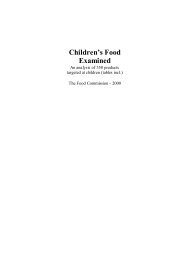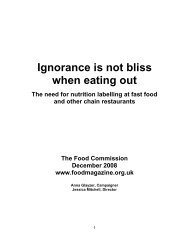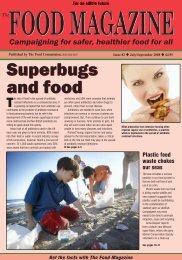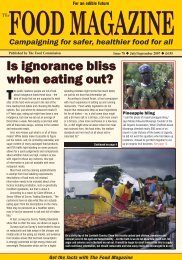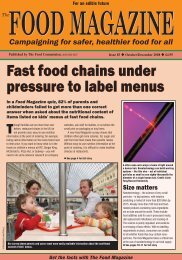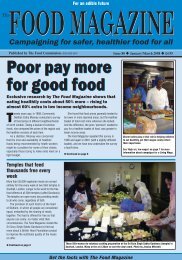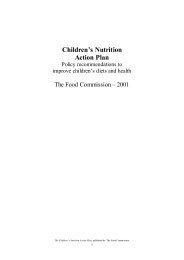Campaigning for safer, healthier food for all - The Food Commission
Campaigning for safer, healthier food for all - The Food Commission
Campaigning for safer, healthier food for all - The Food Commission
You also want an ePaper? Increase the reach of your titles
YUMPU automatically turns print PDFs into web optimized ePapers that Google loves.
news<br />
FSA retreats from<br />
battle with salt sellers<br />
<strong>The</strong> UK <strong>Food</strong> Standards Agency's long-awaited<br />
recommendations <strong>for</strong> reduced salt consumption<br />
revealed a retreat from their previous proposals<br />
which set tough limits on the sodium content of<br />
popular processed <strong>food</strong>s.<br />
<strong>The</strong> FSA's original proposals, published in<br />
2005, set tough targets <strong>for</strong> a range of products,<br />
but these have now been relaxed <strong>for</strong> 85 <strong>food</strong><br />
types. For example, under the original proposals<br />
the amount of salt <strong>all</strong>owed in 100g of potato<br />
crisps was set at 1.4g but this has now jumped to<br />
3.4g. In sausages the maximum was 1.4g salt per<br />
100g but this has jumped up to 1.8g salt.<br />
Professor Graham MacGregor, chairman of<br />
the campaign group Consensus Action on Salt<br />
and Health (www.hyp.ac.uk/cash/) said '<strong>The</strong><br />
power of the <strong>food</strong> industry is once again in<br />
evidence and the purely commercial interests of<br />
<strong>food</strong> companies have been <strong>all</strong>owed to prevail.<br />
<strong>The</strong>re are no reasons why salt content of <strong>food</strong>s<br />
cannot be reduced much further.'<br />
<strong>The</strong> FSA's Director of Consumer Choice and<br />
Dietary Health, Gill Fine, said she was 'pleased<br />
with the work done by many parts of the industry<br />
to enable us <strong>all</strong> to reduce our salt intake' and said<br />
the new guidance was the next step in the FSA's<br />
programme <strong>for</strong> salt reduction. <strong>The</strong> original<br />
proposals had been aimed at reducing average UK<br />
salt consumption to under 6g per day. In an<br />
acknowledgement that the new targets may fail to<br />
reach this goal, Fine said the FSA would 'review<br />
the targets in 2008 to ensure that progress<br />
continues to be made'.<br />
Ms Fine worked <strong>for</strong> nine years as a nutritionist<br />
at supermarket chain Sainsbury's where she<br />
became Head of <strong>Food</strong> and Health, and should<br />
know more than most how to keep the industry on<br />
track. However, the FSA acknowledged it had held<br />
'consultations with more than 250 organisations<br />
together with a range of consumer groups, public<br />
health bodies and independent <strong>food</strong><br />
technologists' – which rather implies that the 250<br />
were mostly from the commercial sector, an<br />
astounding number of 'consultations' and<br />
suggesting a fierce onslaught upon the Agency.<br />
Over-processed, overcooked<br />
and overcompensated<br />
with a<br />
hefty dose of salt –<br />
what is it with<br />
chicken<br />
dishes? <strong>The</strong>se<br />
products <strong>all</strong><br />
boast 2g salt<br />
in a single<br />
portion.<br />
Indeed this Iceland<br />
Cantonese Chicken<br />
provides an incredible 5.8g salt. With only<br />
five sm<strong>all</strong> pieces of ‘battered chicken’ in the<br />
tray this meal appears to be meant <strong>for</strong> one.<br />
We hope that<br />
people who<br />
rely on ready<br />
meals have<br />
good life<br />
insurance!<br />
<strong>The</strong> FSA's current guidelines specify that <strong>food</strong>s should be considered high, medium or low<br />
in salt according to the following:<br />
Salt / 100g<br />
Sodium / 100g<br />
High 1.25g or more 0.5g or more<br />
Medium Between 0.25 and 1.25g Between 0.1 and 0.5g<br />
Low 0.25g or less 0.1g or less<br />
Population-based recommended daily intake is no more than:<br />
Babies<br />
1g salt a day (0.4g sodium)<br />
1 to 3 years 2g salt a day (0.8g sodium)<br />
4 to 6 years 3g salt a day (1.2g sodium)<br />
7 to 10 years 5g salt a day (2g sodium)<br />
11 and over 6g salt a day (2.4g sodium)<br />
Even the 6g target is above what adults actu<strong>all</strong>y need: 95% of the adult population need less than<br />
4g salt (1.6g sodium) <strong>for</strong> normal biological functioning. <strong>The</strong> minimum recommended daily intake is<br />
1.5g salt (0.6g sodium) which is considered sufficient <strong>for</strong> only 5% of the adult population.<br />
<strong>Food</strong> gets personal<br />
How can the <strong>food</strong> industry grow? <strong>The</strong>re's a limit to<br />
the amount people can eat, so <strong>food</strong> companies<br />
must look to new ways to make more money.<br />
Nutrigenomics, 'personalised nutrition', is touted as<br />
the way <strong>for</strong>ward.<br />
Genetic scientists claim that they will be able to<br />
analyse an individual's genetic material (DNA), then<br />
pinpoint the precise nutrition plan <strong>for</strong> optimal health.<br />
Dr Ben van Ommen of the Centre <strong>for</strong> Human<br />
Nutrigenomics, NuGO, explains: '<strong>The</strong> long-term goal<br />
is to provide everyone with scientific<strong>all</strong>y sound<br />
in<strong>for</strong>mation on what they should eat so as to<br />
maintain or improve their health and prevent<br />
diseases associated with ageing.' His centre has<br />
been awarded 17.3m Euros (approx £12 million) to<br />
drive <strong>for</strong>ward this area of research.<br />
Is this type of work likely to <strong>all</strong>eviate dietrelated<br />
disease in Europe? Will expensive<br />
genetic<strong>all</strong>y analysed personalised diets help<br />
the poorest people, most likely to get dietrelated<br />
disease? Will such publicly funded<br />
research programmes avoid focusing on<br />
economic growth <strong>for</strong> the <strong>food</strong> sector, and<br />
avoid helping only affluent people who<br />
probably eat pretty well already?<br />
A new report from GeneWatch UK<br />
suggests not. Entitled Your diet tailored to your<br />
genes: Preventing diseases or misleading<br />
marketing?, it is a far-reaching review of the<br />
science, economics and politics of<br />
nutrigenomics.<br />
<strong>The</strong> report's conclusion is compelling: '<strong>The</strong> <strong>food</strong><br />
and biotechnology industries, and many of the<br />
scientists they fund, have<br />
widely promoted the idea<br />
that the ultimate goal of<br />
nutritional research should<br />
be 'personalised nutrition',<br />
involving individual diets<br />
based on a person's genes<br />
and, perhaps in the longer<br />
term, on other biological<br />
measurements and continual<br />
monitoring. However, the<br />
scientific evidence does not<br />
support the conclusion that<br />
such an approach will benefit<br />
health. For most diet-related diseases in most<br />
people, the key to prevention lies not in individual<br />
biological differences but in tackling the 'politics of<br />
<strong>food</strong>' and issues such as <strong>food</strong> industry marketing<br />
practices, socio-economic deprivation, health<br />
inequalities, transport and the lack of sports<br />
facilities in schools.'<br />
How else could £12m of public money be<br />
spent, rather than expensive research to help the<br />
wealthy few? Training <strong>for</strong> caterers? Seed grants<br />
<strong>for</strong> co-ops to supply schools with fresh <strong>food</strong>?<br />
<strong>The</strong> European research agenda seems every<br />
bit as skewed as European diets.<br />
See: www.genewatch.org/HumanGen/<br />
GenesAndHealth.htm<br />
<strong>Food</strong> Magazine 73 4<br />
Apr/Jun 2006



